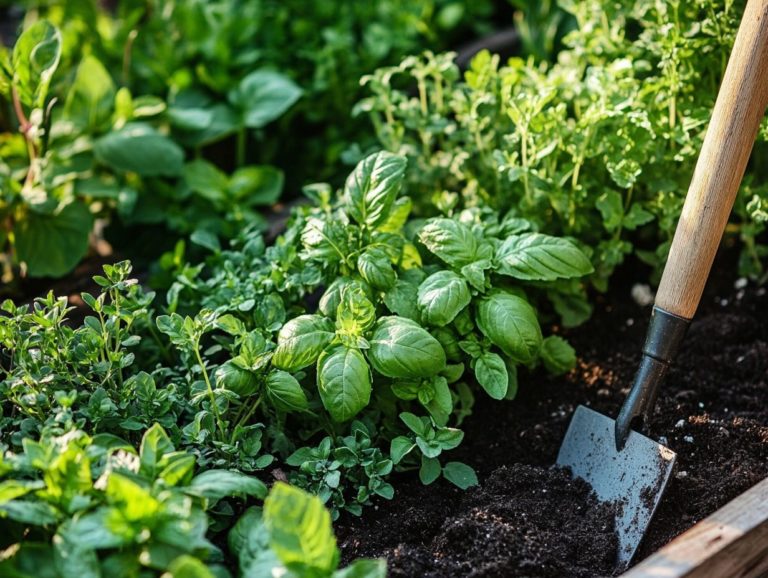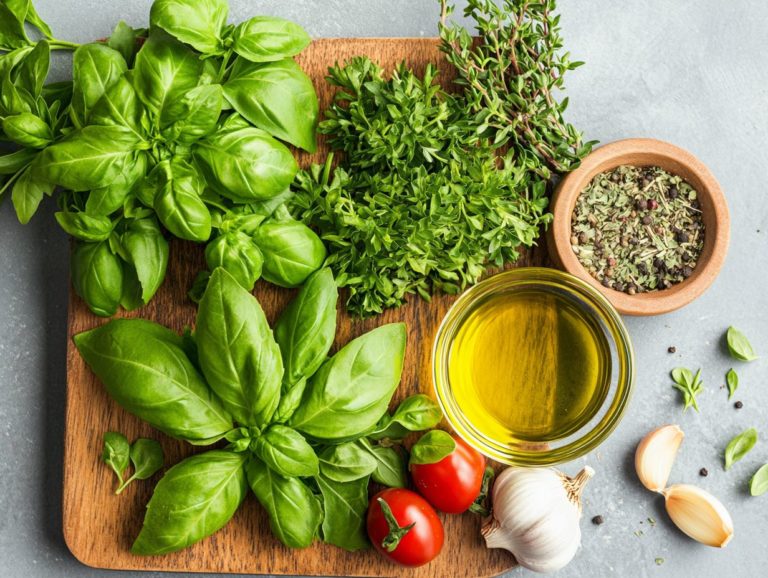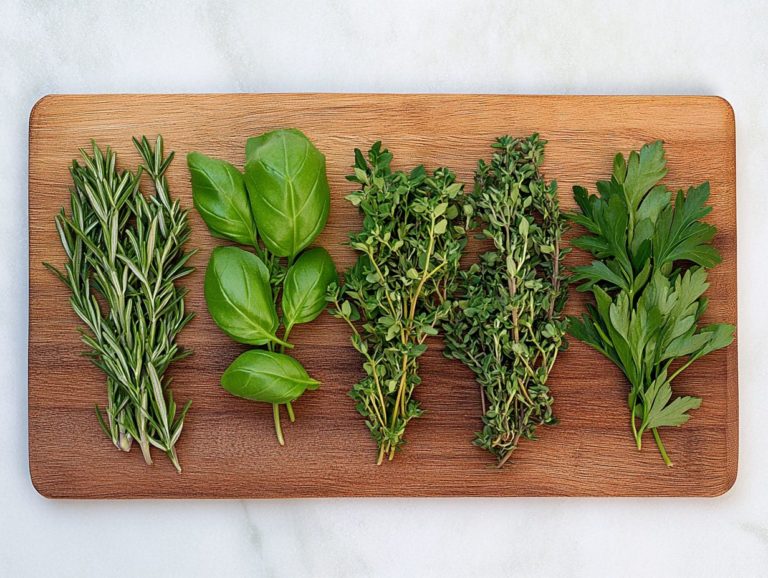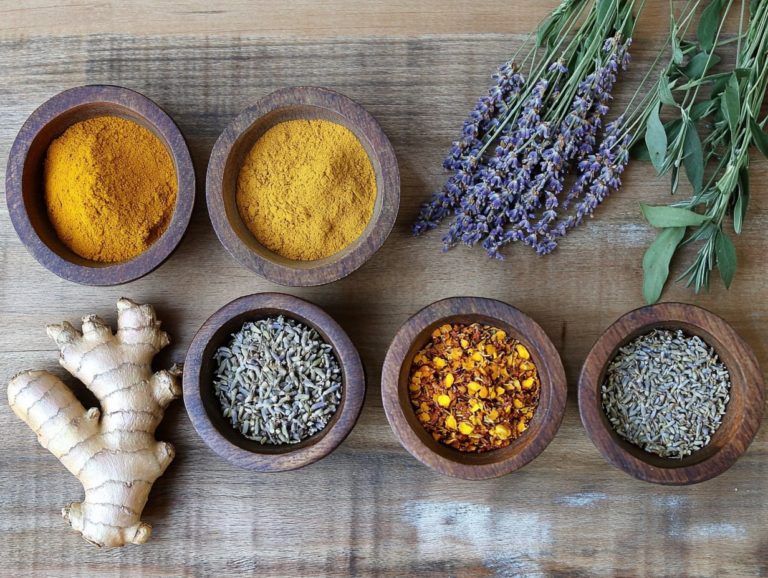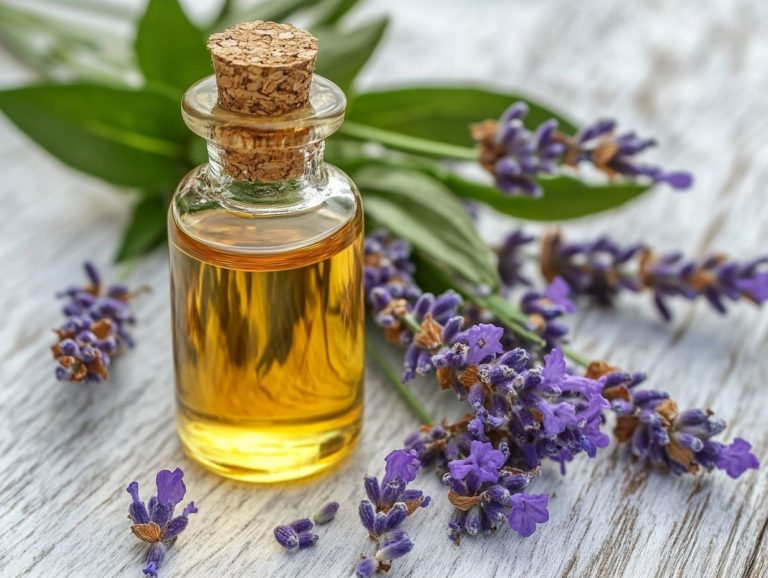Herbal Remedies for Cold and Flu Symptoms
As the seasons shift, you may find yourself more susceptible to colds and the flu, facing an unwelcome assortment of symptoms that can leave you feeling quite miserable.
While conventional medicine provides some relief, many are increasingly turning to the potent healing power of nature.
This article delves into the common symptoms linked to colds and the flu, underscores the advantages of herbal remedies, and highlights effective herbs that can ease your discomfort and enhance your immune health.
Discover how nature’s powerful remedies can rejuvenate your body and spirit!
Contents
- Key Takeaways:
- Overview of Cold and Flu Symptoms
- Benefits of Herbal Remedies
- Herbal Remedies for Cold Symptoms
- Herbal Remedies for Flu Symptoms
- Preventing Cold and Flu with Herbs
- Frequently Asked Questions
- What are herbal remedies for cold and flu symptoms?
- What are some common herbal remedies for cold and flu symptoms?
- Are herbal remedies safe to use for cold and flu symptoms?
- What is the recommended dosage for herbal remedies for cold and flu symptoms?
- Can herbal remedies be used in conjunction with other medications?
- How long does it take for herbal remedies to work for cold and flu symptoms?
Key Takeaways:
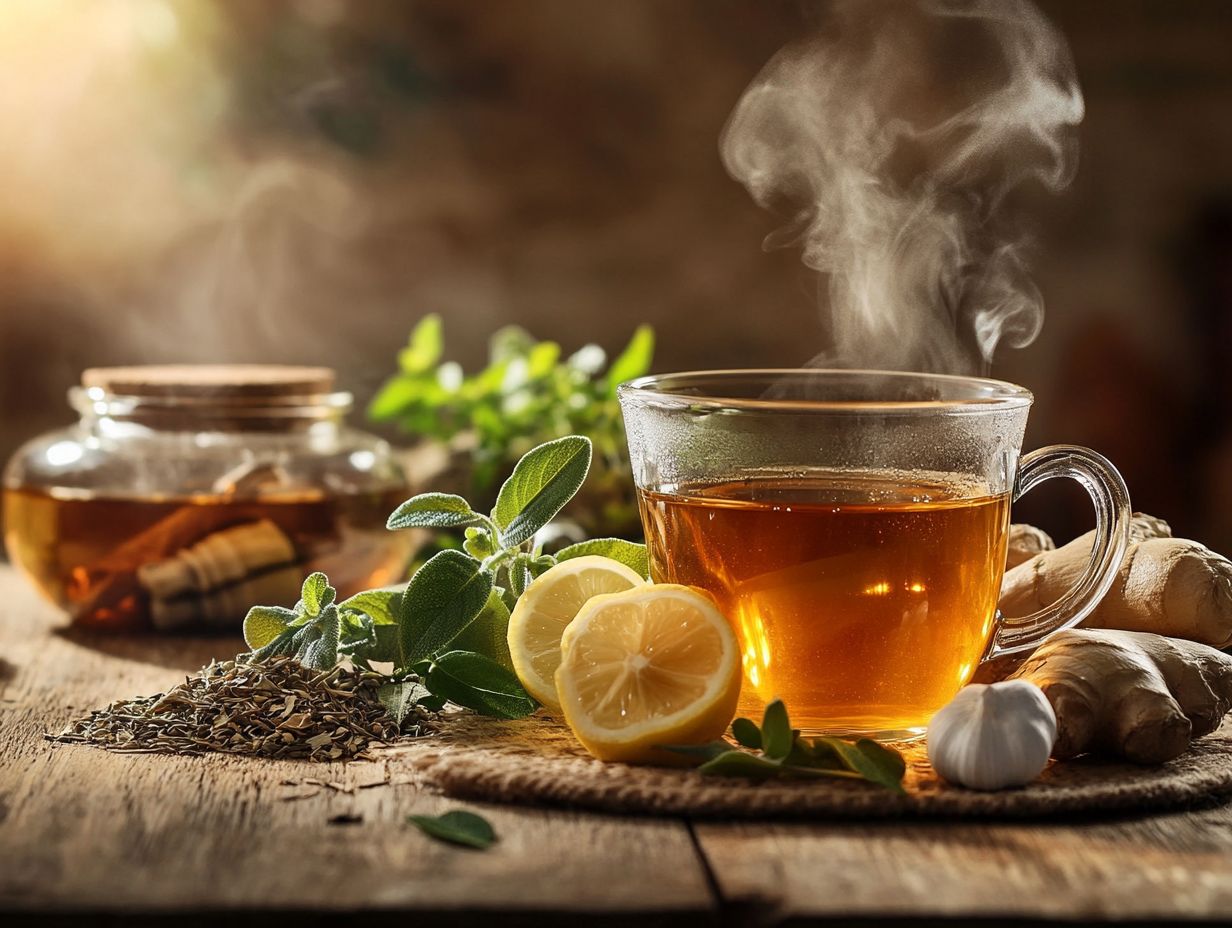
- Herbal remedies can effectively relieve symptoms of the common cold, such as congestion, cough, and sore throat, without harsh side effects.
- Herbal remedies can also help prevent colds and flu by boosting the immune system and promoting overall health.
- Elderberry, ginger, and echinacea are powerful herbs traditionally used to fight off the flu and its symptoms.
Overview of Cold and Flu Symptoms
Cold and flu are common respiratory infections caused by distinct viruses, each showcasing a unique array of symptoms affecting people across all age groups.
These conditions often bring discomfort and can disrupt daily life, highlighting the importance of recognizing their early signs.
Common symptoms include a runny nose, sore throat, cough, and nasal congestion, with variations in severity. By understanding these symptoms, you can take proactive measures to find relief and support your immune health, especially during peak seasons.
What are Cold and Flu?
The terms “cold” and “flu” are often misunderstood; they refer to viral infections affecting your upper respiratory tract, each caused by different pathogens.
The common cold is mainly caused by rhinoviruses, which are viruses that commonly cause colds and spread easily through respiratory droplets think coughing, sneezing, or touching contaminated surfaces. On the other hand, influenza, or the flu, is triggered by the influenza virus and can lead to a more severe range of symptoms, including high fever and body aches.
Although both conditions share symptoms like nasal congestion, sore throat, and fatigue, the flu tends to deliver a more intense and debilitating experience.
Understanding these differences is crucial for improving your self-care and prevention methods.
Common Symptoms
Common symptoms of cold and flu can significantly overlap, yet they manifest in distinct ways that impact your daily life and overall wellness.
A mild cold might present itself with a runny or stuffy nose, sneezing, and a sore throat. The flu, however, typically unleashes more severe symptoms, like a high fever, muscle aches, and overwhelming fatigue.
If you’re dealing with a cold, you might find solace in simple home remedies such as warm teas and lozenges. However, if the flu has you in its grip, you ll likely need more substantial interventions, like antiviral medications and plenty of hydration.
Your immune system plays a vital role in both scenarios, working tirelessly to defend against the pathogens that cause these illnesses. Understanding these distinctions not only helps in correctly identifying your condition but also guides you toward the appropriate self-care and treatment strategies.
Benefits of Herbal Remedies
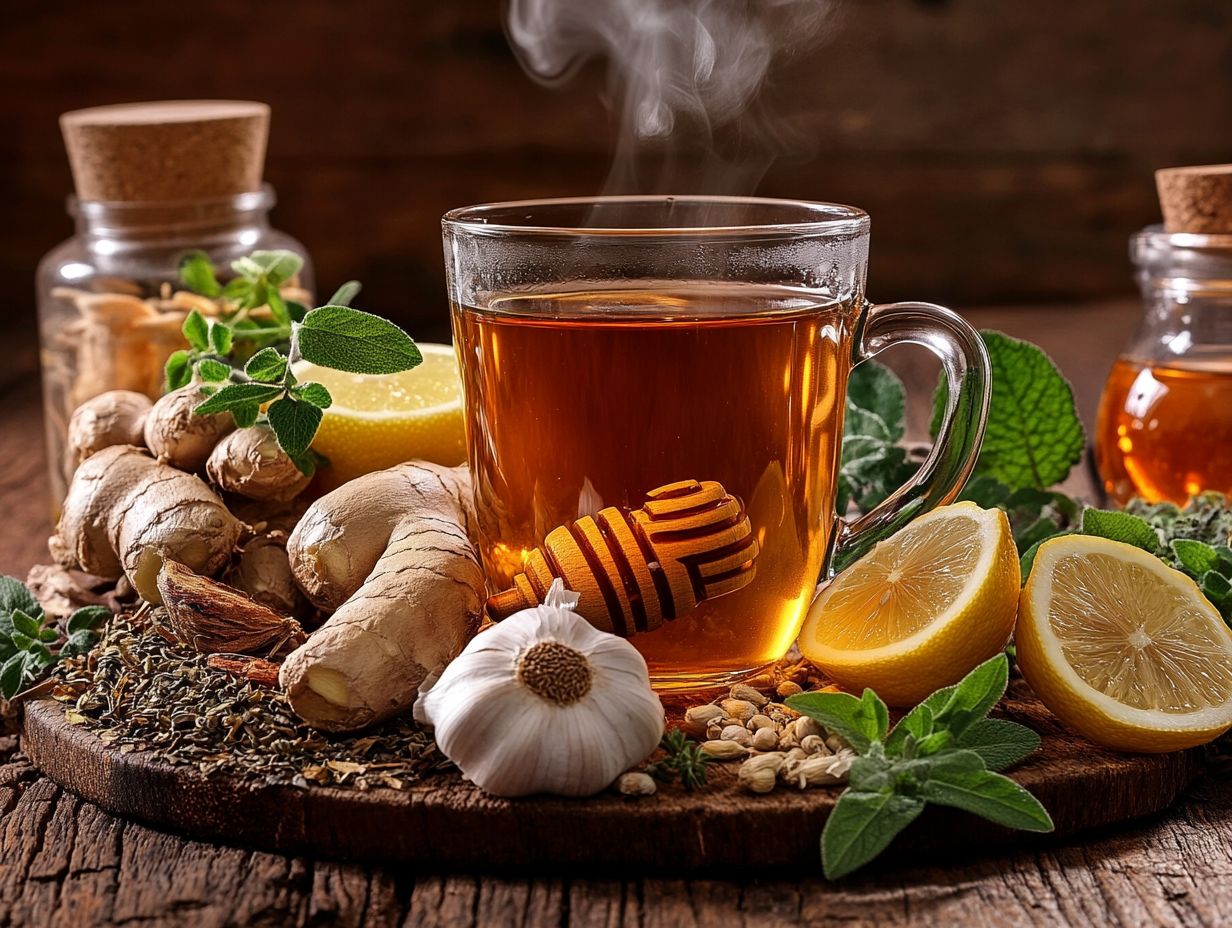
Herbal remedies have stood the test of time, offering a rich array of health benefits that can naturally bolster your immune system and ease the symptoms of colds and flu.
From the potent properties of garlic to the well-known effects of echinacea, these natural treatments not only prove effective but also embrace a holistic approach to healing.
By incorporating herbal ingredients into your diet, you enhance your overall wellness, supplying essential nutrients and compounds that conventional treatments may overlook.
Recognizing these benefits inspires you to explore alternative remedies that promote health, all while avoiding the harsh side effects often tied to pharmaceuticals.
Start your journey to better health with herbal remedies today!
Natural Healing Properties
The natural healing properties of various herbal remedies offer promising benefits if you re exploring alternative treatments for colds and flu. These remedies are rooted in centuries of folk tradition.
Many individuals today are turning to herbs like echinacea and elderberry for their immune-supporting qualities. Echinacea is renowned for its ability to enhance your body s defense mechanisms and is often used at the first sign of cold symptoms to potentially shorten their duration.
Elderberry has gained popularity for its impressive antioxidant profile and antiviral properties, making it a go-to choice for those looking to strengthen their immune system. By embracing these natural solutions, you can access a wealth of healing practices that effectively support your wellness.
Herbal Remedies for Cold Symptoms
Herbal remedies can help you feel better quickly, offering effective and soothing alternatives to traditional medications. Ingredients like honey, ginger, and garlic are renowned for their ability to ease discomfort and enhance overall well-being.
These healing foods can easily be woven into your daily routine through comforting practices such as herbal teas and steam inhalation. You can find relief from pesky symptoms like cough, nasal congestion, and sore throat, paving the way for a smoother recovery journey.
Effective Herbs for Relieving Symptoms
Certain effective herbs are well-known for their ability to alleviate cold symptoms, offering a natural path to healing.
- Peppermint: Known for its cough-suppressing qualities, peppermint can soothe a nagging scratch in your throat. Use it in calming teas or inhale its essential oils through steam for quick relief.
- Yarrow: A formidable ally in reducing fever, yarrow brewed into tea cools your body and helps your immune system fight infections.
- Elderberry: Celebrated for its antioxidant-rich benefits.
- Ginger: Renowned for its anti-inflammatory properties that help ease cold symptoms.
By preparing these herbs in teas or tinctures, you can unlock their full health benefits and tap into nature s remedies.
Herbal Remedies for Flu Symptoms
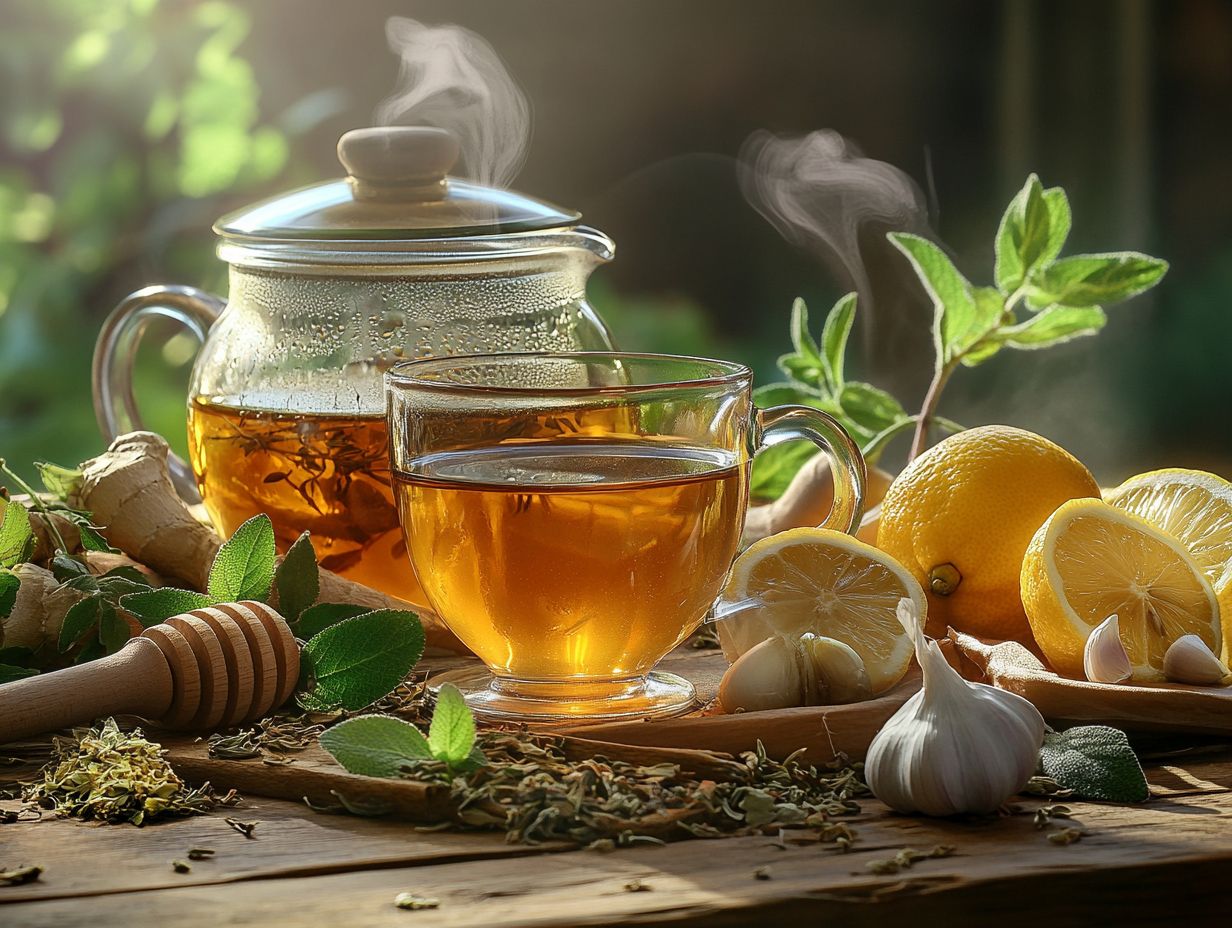
Herbal remedies for flu symptoms provide robust support for your immune system. They enable you to combat flu severity and accelerate your recovery. Ingredients like echinacea and ginger harness their infection-fighting properties and can potentially reduce both the duration and intensity of your symptoms.
These remedies assist in managing fever and body aches while promoting overall wellness through natural healing. By understanding how to effectively utilize these herbs, you empower yourself to take control of your health during flu season.
Powerful Herbs for Fighting the Flu
Several powerful herbs emerge as champions in the fight against the flu, assisting your body in recovery and alleviating distressing symptoms.
- Echinacea: Celebrated for its immune-supportive properties, it helps stimulate your body’s defenses especially crucial during flu season. Brewed as tea, its roots and flowers offer soothing relief.
- Ginger: Boasting impressive anti-inflammatory benefits, ginger provides comfort for sore throats and congestion. Incorporating fresh ginger into your soups or teas enhances flavor and health benefits.
These herbs can be invaluable allies in your pursuit of effective flu treatment, promoting quicker recovery and overall wellness.
Try these herbal remedies today and boost your immune system!
Preventing Cold and Flu with Herbs
Preventing colds and flu with herbs is a smart choice that highlights the importance of a strong immune system, especially during peak infection seasons. By integrating dietary supplements and herbal ingredients like zinc and vitamin C into your daily routine, you can strengthen your body s defenses against respiratory infections.
Taking action now can greatly reduce your chances of getting sick! Incorporating herbs such as garlic and ginger can significantly enhance this preventive framework, providing you with natural alternatives to support your immune response.
Boosting Immunity and Preventing Illness
Boosting your immunity with the right herbs can be a game changer in preventing illness, particularly during the cold and flu seasons when viral infections often emerge.
Incorporating specific herbs like echinacea and elderberry into your daily routine can offer significant health benefits. These natural remedies are well-known for their antiviral properties substances that can fight viruses and immune-stimulating properties. For example, echinacea can help reduce both the duration and severity of respiratory infections, while elderberry is celebrated for its ability to enhance your immune response.
Essential oils like tea tree and oregano have strong antibacterial and antiviral qualities, making them effective strategies for prevention. By using these herbs and oils in teas, tinctures, or diffusers, you can cultivate a stronger defense against pathogens and promote your overall wellness throughout the year.
Frequently Asked Questions
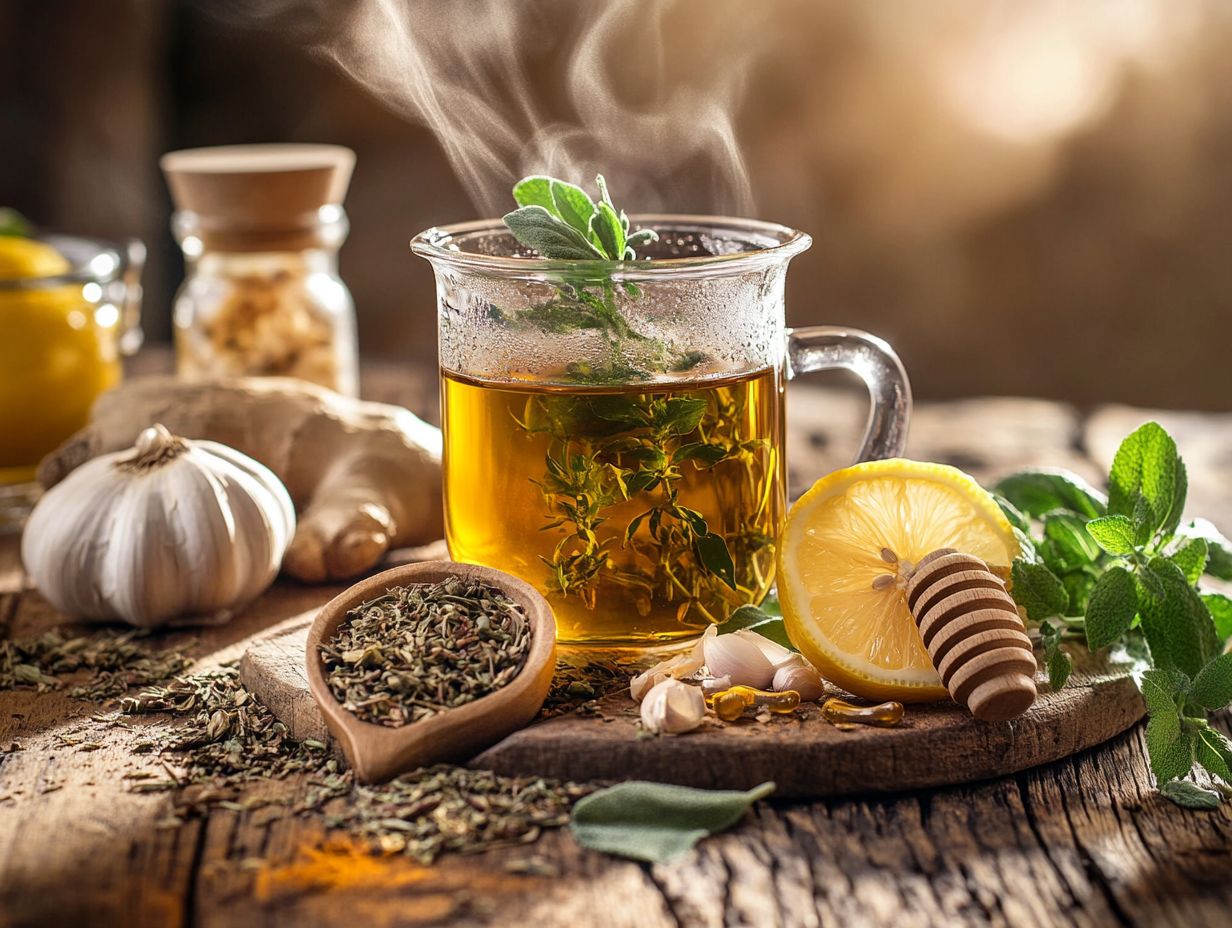
What are herbal remedies for cold and flu symptoms?
Herbal remedies for cold and flu symptoms are natural and plant-based treatments that help alleviate common symptoms such as sore throat, congestion, and body aches. For additional support, exploring the best herbal remedies for respiratory health is beneficial, as they are believed to strengthen the immune system and promote overall wellness.
What are some common herbal remedies for cold and flu symptoms?
Common herbal remedies for cold and flu symptoms include echinacea, garlic, ginger, and elderberry. These herbs possess anti-inflammatory and immune-boosting properties that may help alleviate symptoms and shorten the duration of a cold or flu.
Are herbal remedies safe to use for cold and flu symptoms?
When used properly, herbal remedies are generally safe for most people. However, it is important to consult with a healthcare professional before trying any new herbal remedies, especially if you are pregnant, breastfeeding, or have any pre-existing medical conditions.
What is the recommended dosage for herbal remedies for cold and flu symptoms?
The recommended dosage for herbal remedies may vary depending on the specific herb and form of the remedy (tea, capsule, tincture, etc.). It is important to carefully follow the instructions on the product label or consult with a healthcare professional for the appropriate dosage.
Can herbal remedies be used in conjunction with other medications?
It is important to consult with a healthcare professional before using herbal remedies with other medications. Some herbs may interact with certain medications and cause adverse effects. Always disclose any herbal remedies you are using to your doctor or pharmacist.
How long does it take for herbal remedies to work for cold and flu symptoms?
The effectiveness of herbal remedies may vary for each individual and also depends on the severity of symptoms. It is important to use them consistently and as directed to see the full benefits. Some herbal remedies may start to work within a few hours, while others may take several days.
In conclusion, herbal remedies offer a natural way to support your immune system and combat cold and flu symptoms. By taking proactive steps and integrating these remedies into your routine, you can help safeguard your health. Consider sharing your experiences with herbs or consulting a healthcare professional for personalized advice.

